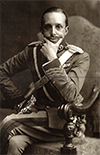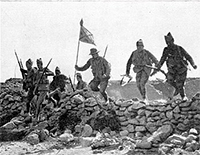King Alfonso XIII of Spain
Alfonso XIII was King of Spain for 45 years, in the 19th Century and 20th Century. 
He was born on May 17, 1886, at the Royal Palace in Madrid. His father was Alfonso XII, who had died a few months beforehand, and his mother was Queen Maria Christina, who assumed the regency when baby Alfonso was born. He underwent military training of the highest order; this formed the bulk of his studies. People in Cuba, long a Spanish possession, had risen up in a coordinated rebellion in 1868. That struggle lasted for a decade and ended in nothing so much as exhaustion on both sides. Another uprising in 1879 resulted in a Spanish triumph the following year. Cuba again was awash in protest in 1895, as the latest drive for independence, ignited by José Martí and a group of guerrilla fighters, gained support from the neighboring United States and blossomed into all-out war between Spain and the U.S. in 1898. American forces overwhelmed Spanish forces in a matter of months, and a treaty in December 1898 ended the fighting. Throughout all of that, Alfonso was technically king but still in a regency situation. His mother retained her role as regent until 1902, when the boy turned 16. A number of festivities marked his ascension to rule without regent. 
Four years later, Alfonso married Victoria Eugenia of Battenberg, a niece of the United Kingdom's King Edward VII. The couple had seven children, five of whom survived to adulthood: Alfonso (1907), Jaime (1908), Beatriz (1909), María Cristina (1911), Juan (1913), and Gonzalo (1914). Alfonso and Spain declared neutrality during World War I. One reason was that the king had family connections on both sides. His wife's uncle was the U.K. monarch, and his mother had ties to the Austrian royalty. Another reason for Spain's neutrality was that the country played no part in either of the major entangling alliances (Triple Alliance and Triple Entente) that presaged the Great War and so felt no need to go to war just because another country had been attacked. German submarines sank dozens of Spanish ships during the war, and an absence of trade with other nations significantly affected the Spanish economy. Complicating the situation were up to 10,000 workers who returned to their homes as refugees from war-torn Belgium, France, and Germany. 
The king formed the European War Office, dedicated to helping victims of the war on both sides, military or civilian. Staffing the office from within the Royal Palace were dozens of people who helped find missing people and transferred letters from prisoners to their families, A primary success of this office and its efforts was a widely lauded and respected agreement not to fire on hospital ships. Another was to convince both sides to stop capital punishment of prisoners of war. The European War Office worked in conjunction with the International Red Cross. In 1917, King Alfonso XIII received a nomination for the Nobel Peace Prize. The Nobel committee gave that award to the Red Cross. One of the devastating results of the war was the 1918 flu pandemic, known as the Spanish Flu. Alfonso XIII caught this flu and narrowly avoided death. Staying out of a war in Central Europe was one thing. Giving up possession of yet another overseas possession was another. Spain, having lost its last vestiges of New World and Pacific possessions in the Spanish-American War, wanted to hold on to the Rif region in Morocco, perhaps in hopes of expanding southward into more of Africa. Conflicts between Spanish and Rifian forces occurred as early as 1909 but exploded in 1921 and continued for five years, with Spain, aided by French muscle, emerging victorious. 
During the Rif War, Spanish General Miguel Primo de Rivera launched a coup and declared himself a dictator. The king approved of the move, and Rivera was in charge until 1930. Public opinion of the dictatorship and the king's support for it waned. Alfonso XIII became highly unpopular and, after a disastrous showing in the 1931 elections, agreed to leave the country, in favor of the founding of the Second Spanish Republic. Alfonso, no longer king, ended up in Rome, along with his family. His oldest son, also named Alfonso, wanted nothing to do with the Spanish throne; nor did his younger brother Jaime. This left Alfonso's third son, Juan, as the heir to the throne. When the country descended into civil war in 1936, Alfonso sent Juan back to Spain to join in the fighting. However, one of the leaders of the Nationalist side had Juan arrested and deported. The warn ended in a victory for Francisco Franco and the Nationalists, and Franco took over the rule of the country. Alfonso XIII, still in Rome, in 1941 officially abdicated his throne, then long defunct, in favor of his surviving son, Juan. (His fourth son Gonzalo had since died.) Alfonso died of a heart attack on Feb. 28, 1941. He was 54. |
|
Social Studies for Kids
copyright 2002–2026
David White




